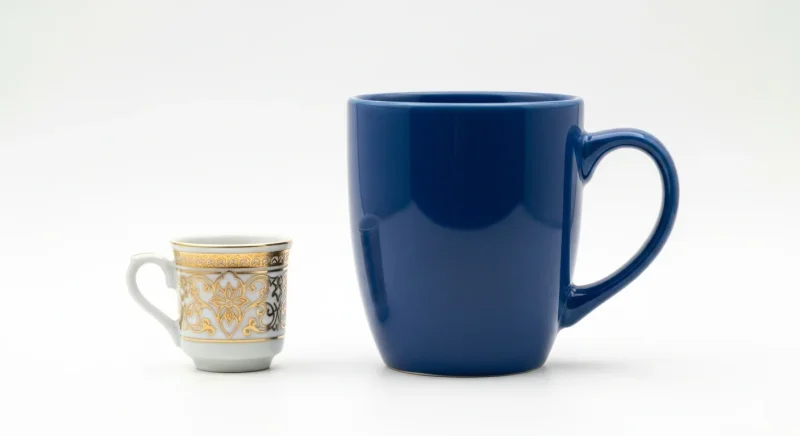Turkish coffee is an intense and flavorful experience, but its strong, unfiltered nature often leaves people wondering: Is this actually healthy? The answer is a bit more complex than a simple yes or no, balancing potent benefits with a few specific risks you should know about.
Key Takeaways
- Overall Verdict: Turkish coffee is generally healthy when consumed in moderation (about 1-2 cups per day).
- Key Benefit: It is unfiltered, which means it retains a higher concentration of beneficial compounds (like antioxidants) than filtered coffee.
- Key Risk: It is also unfiltered, which means it contains compounds (diterpenes) that may raise LDL (bad) cholesterol in some people when consumed in large amounts.
- Caffeine: It has a strong, concentrated taste, but a single cup often has less total caffeine than a large mug of drip coffee.
What's the Verdict: Is Turkish Coffee Good for You?
The short answer is yes, but with some important details.
Like many traditional foods, the health benefits of Turkish coffee are found in its unprocessed, authentic state. Because it is unfiltered, it offers a more potent dose of the compounds that make coffee healthy.
However, that same unfiltered nature also presents its main drawback. Here’s a simple breakdown of the benefits versus the risks.
The Health Benefits of Turkish Coffee
1. It is Packed with Antioxidants
The most significant health benefit comes from the brewing method. Because the ultra-fine coffee grounds are steeped directly in the water (and not passed through a paper filter), more of the coffee's natural compounds are extracted.

Turkish coffee is particularly rich in chlorogenic acids, powerful antioxidants that are known to help reduce inflammation, improve blood sugar, and support heart health.
2. It May Boost Mental Alertness
Like all coffee, the caffeine in Turkish coffee provides a noticeable boost in energy and mental focus. Because it is served in a small, concentrated dose, this effect is often felt quickly, making it an excellent pick-me-up for alertness and concentration.
3. Potential Cardiovascular Benefits
The potent antioxidants in Turkish coffee have been linked to better heart health. These compounds can help protect your cells from damage and may contribute to lower blood pressure and a reduced risk of heart disease when consumed as part of a balanced diet.
Potential Risks and Common Myths
The main risks associated with Turkish coffee are the same as those for any unfiltered brew (like French press coffee) and are primarily related to its high concentration.
1. Caffeine Content (The Biggest Question)
It tastes stronger, but is it?
- Concentration: On a per-ounce basis, Turkish coffee is more caffeinated than a shot of espresso.
- Total Caffeine: However, a typical Turkish coffee cup (fincan) is very small (about 2-2.5 ounces). A large 8-12 ounce mug of American-style drip coffee will almost always have more total caffeine than one cup of Turkish coffee.

The risk here is drinking too many cups. Because they are small, it can be tempting to have three or four, which would quickly exceed the recommended daily caffeine intake (around 400mg).
2. The Unfiltered Risk: Cholesterol
This is the most important health consideration. Unfiltered coffee contains naturally occurring oily compounds called diterpenes (specifically cafestol and kahweol).
Paper filters trap most of these compounds. In unfiltered coffee, they remain in the brew. These diterpenes have been shown to cause a significant increase in LDL (bad) cholesterol levels in some individuals.
For most people, one cup a day is not a concern. But if you have high cholesterol, this is a factor to discuss with your doctor.
3. The Sugar Myth
Many people associate Turkish coffee with being very sweet. It can be served sweet ("şekerli"), but it is traditionally offered "sade" (plain, with no sugar). The coffee itself is not the health issue; the added sugar is. For the healthiest experience, drinking it "sade" is the best choice.
Turkish Coffee and Common Health Questions
Can It Help with Weight Loss?
Any coffee containing caffeine can temporarily boost your metabolism and act as an appetite suppressant. This has led to the myth that Turkish coffee is a weight-loss drink.
While a "sade" (plain) cup of Turkish coffee is very low in calories, it is not a magic solution for weight loss. Furthermore, if you drink it with sugar, you are adding empty calories that will work against any weight-loss goals.
Can I Drink Turkish Coffee on an Empty Stomach?
You can, but it may not be comfortable. Because it is so strong and concentrated, drinking it on an empty stomach can be harsh on your digestive system. It may cause discomfort, acid reflux, or that jittery, wired feeling. It's generally better to have it after a small amount of food.
What is the 90-Minute Rule for Coffee?
You may have seen this coffee rule online. This is a general "bio-hacking" tip that is not specific to Turkish coffee.

The rule suggests waiting 90 minutes after you wake up before drinking any coffee. The theory is that your body's natural cortisol (the "wake up" hormone) levels are highest when you first wake. Waiting allows your cortisol to peak and fall naturally, so the caffeine gives you a real boost instead of just replacing your body's own, which may help prevent an afternoon energy crash.
The Bottom Line
For most healthy adults, Turkish coffee is a safe and enjoyable part of a balanced diet.
To maximize the benefits and minimize the risks:
- Stick to Moderation: One or two cups per day is the general recommendation.
- Go "Sade": Skip the sugar to avoid empty calories.
- Listen to Your Body: Avoid it on an empty stomach if you are sensitive.
- Be Aware of Cholesterol: If you have high LDL, you may want to limit your intake of all unfiltered coffees.
- Remember the Rules: As our main guide to making and drinking Turkish coffee explains, always drink a sip of water first, and do not drink the sludge (telve) at the bottom of the cup.
![Jekyll Island Campground Review: Best Sites & [year] Guide](https://www.rotasenin.com/uploads/2025/12/jekyll-island-campground-rv-sites.webp)





Comments (0)
Sign in to comment
Report